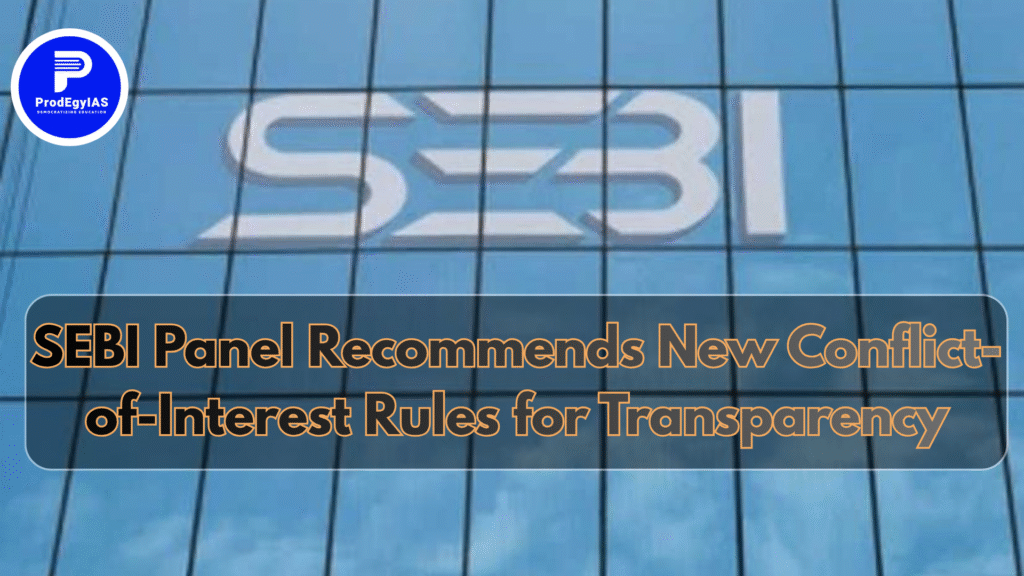
One of the biggest governance overhauls in recent years has been proposed by SEBI’s High-Level Committee to improve its conflict-of-interest (COI) and transparency framework. A systematic, multi-tier public disclosure system that requires senior SEBI officials—from the Chairperson to Chief General Managers—to disclose their assets and liabilities is one of the main proposals.
In order to boost investor confidence and guarantee honest, open market operations, the committee also suggested universal investment restrictions, required recusal standards, and a more robust whistleblower system.
These changes are especially important because Madhabi Puri Buch, the former head of SEBI, was accused of having a conflict of interest when the panel was formed. The committee carefully examined the current regulations and suggested changes to improve SEBI’s transparency, accountability, and moral governance.
Background: Why the Committee Was Formed
- In response to accusations made by Hindenburg Research against former SEBI Chairperson Madhabi Puri Buch, SEBI formed this High-Level Committee in March.
- Buch and her husband, according to the short seller, had concealed assets in offshore funds that were allegedly connected to organizations connected to the Adani Group. Although the Buch family and the Adani Group denied these accusations, the dispute raised significant concerns regarding the integrity of regulations.
- The committee’s job was to examine SEBI’s whole disclosure and conflict-of-interest policy, its sufficiency, and any potential weaknesses that would jeopardize decision-making.
Former regulators, business leaders, and governance experts made up the group, which was presided over by Pratyush Sinha, a former Chief Vigilance Commissioner and retired IAS officer.
Mandatory Public Disclosure by Top Officials
- Public disclosure of the assets and liabilities of SEBI’s Chairperson, Whole-Time Members, Executive Directors, and CGM-level officials is a key recommendation.
- Before being appointed, candidates for these high positions must also disclose any real, potential, or perceived conflicts—financial or non-financial.
- This is meant to stop regulatory decisions from being influenced by hidden interests.
Uniform Investment & Trading Restrictions
- The committee suggested that the Chairperson and Full-Time Members be subject to the same trading and investing limitations as SEBI employees.
- According to insider-trading regulations, this involves designating them as “insiders.”
Key points include:
- Only properly managed, regulated pooled funds may be invested in by top authorities.
- Limitations will not be applied retroactively, but rather prospectively.
- Although they are not subject to investment caps, part-time members are nonetheless required to declare their interests and refrain from exploiting unpublished price-sensitive information (UPSI).
- Spouses and relatives who are financially dependent will be subject to the rules.
In addition, new Chairpersons and Whole-Time Members have to decide whether to freeze, liquidate, or sell their current shares through a trading plan or with prior clearance.
Broader and Stricter Definition of ‘Family’
- The committee suggested broadening the concept of “family” to encompass all married and blood relatives who are financially dependent in order to guarantee consistent conflict checks.
- People the member has legal guardianship over.
- This closes gaps brought about by restrictive definitions and brings SEBI into compliance with international regulatory standards.
Other Major Governance Reforms
1. Structured Recusal Framework
- The committee demanded the creation of an official and open recusal procedure.
- When there is a dispute, senior SEBI officials will have to abstain from talks and decision-making.
Additionally, it suggested that the SEBI Annual Report include an annual overview of recusals, which is currently not done.
2. Strong Whistle-Blower Protection
Establishing a private, anonymous whistleblower mechanism is a significant reform.
This system would make it possible to report possible or suspected COI incidents involving players, market institutions, intermediaries, or SEBI personnel without worrying about reprisals.
3. Post-Retirement Cooling-Off Period
It is suggested that former SEBI members, consultants, and staff be prohibited from speaking before or against SEBI in regulatory issues for a period of two years.
This strengthens ethical governance and attempts to avoid undue influence.
4. Ban on Gifts & Benefits
The panel suggested prohibiting the Chairperson and Whole-Time Members from taking gifts from people or organizations they deal with on a formal basis in order to prevent undue influence.
5. New Ethics & Compliance Structure
In order to monitor COI-related concerns and guarantee uniform ethical standards, the committee recommended establishing an Office of Ethics and Compliance (OEC) and an Oversight Committee on Ethics and Compliance (OCEC).
6. AI-Based Conflict Monitoring System
The panel recommended creating a data-analytics-driven, AI-enabled system to proactively identify and monitor COI threats.
It is anticipated that this will increase openness and strengthen SEBI’s capacity to respond quickly to possible infractions.
UPSC General Studies Paper Preparation
| Topic | |
| UPSC Syllabus | UPSC Free Notes |
| UPSC Optional Subjects | Khushhali Solanki (AIR 61, UPSC CSE 2023) |
Public Administration Optional Exam Preparation
Topic | |
About the Author: Jyoti Verma



